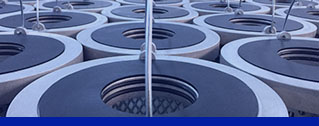
Filters are a small however very important a part of hydraulic equipment, though serving no mechanical purpose they're integral to the correct functioning of the machine and to prolonging the active life of the gear and the hydraulic fluid which drives it. The role of a filter is to take away and/or comprise particles of contamination and preserve the fluid that flows around the machine clear. Any contamination in the oil could cause damage to transferring components further downstream, and this could result in seizing up of moving parts, corrosion of other components and dear replacements. After we think about the consequences of not using a filter, the importance of those little items becomes extra important.
Â
There are two principal kinds of hydraulic oil filter – floor and depth filters. The surface filter, as the name suggests, removes contamination from the surface of the oil and could also be useful in applications the place gravity feeds the oil by a space suitable for such a filter throughout operation. A depth filter could be submerged in a reservoir or chamber and can remove particles from the whole lot of the physique of fluid. Depth filters subsequently, are more effective and can retain a larger quantity of contamination and unwanted particles before they have to be cleaned or replaced.
Â
The supplies used to make hydraulic filters varies, as does the fee accordingly. Glass filters are costlier however they're more efficient, particularly when glass fibres are utilized in a depth filter. Glass is also non-reactive, which means it may be used with any kind of hydraulic fluid. Steel filters are additionally reasonably efficient, but they can't be used with all kinds of hydraulic fluid, due to incompatibilities between certain hydraulic oils and some metals. Where it's acceptable to use a metallic filter there's the choice of a magnetic filter system, which works as a depth filter and makes use of a magnetic cost to draw metallic particles which will have entered the fluid system. If the hydraulic equipment is used in metallic working and fabrication then the chance of potential contamination being from metallic particles is excessive; magnetic filters will cope with this contamination while another kind of filter can be utilized to deal with other sorts of air pollution.
Â
Cellulose or paper may also be used to make a hydraulic fluid filter, but these have a brief life expectancy and need frequent here substitute. They're cheaper than the other types, but might find yourself costing extra in the long run, as a result of regular downtime for alternative and the potential damage to equipment if they aren't replaced usually enough.
Â
It might appear to be glass is your best option; despite costing somewhat extra it does one of the best job and won't need changing too usually. The disadvantage of a glass filter is actually its energy as effectively; the superior filtering skill can actually lead to a drop in pressure, in the system, which is normally undesirable. It is very important, subsequently, to examine how a drop in hydraulic system pressure will have an effect on productivity and efficiency if you're contemplating switching to glass filters from one other material type. Take into account also whether or not this drop in pressure is prone to result in unnecessary changes of pressure reduction valves, resulting in probably dangerous build ups of strain elsewhere.
Â
The options of hydraulic oil filters do not finish after materials sort and construction, as there is still the problem of ratings and specifications to deal with. All filters have an ISO 4406 ranking, and the lower the code of any given filter, the better it is at removing contamination. Hydraulic filters can also have a beta ratio, which is the ratio of particles found upstream of the filter divided by the number found downstream. For beta ratios, the upper it is the higher, and this may also be used to present a proportion for effectiveness.
Â
It can be vital to verify that the stream rate of the filter is appropriate with the circulate fee of the equipment it is to be used in; too quick and the filter will be unable to effectively remove contamination, too gradual and it could turn out to be clogged shortly. The operational stress of the hydraulic system can also be important, as the filter must be capable to withstand that drive for a chronic period of time. The final thing to verify is that the filter could be related to the tools, so test the port size of the filter and ensure it is compatible with the machinery within the location it's to be fitted.
Â
There's a lot to think about here, but choosing probably the most appropriate hydraulic fluid filter is an exercise that it is value spending some time on, as it will probably make a giant distinction to the performance and lifespan of your hydraulic equipment and save on downtime and replacement prices in the long term.